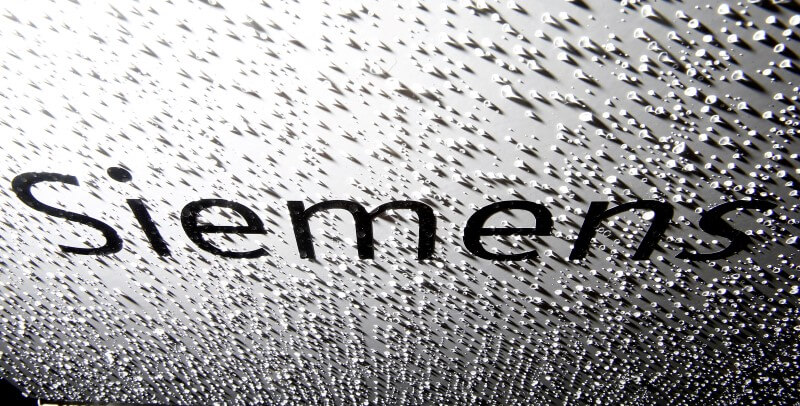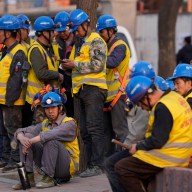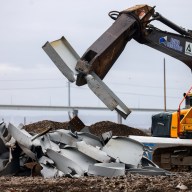By Anton Zverev and Gleb Stolyarov
SIMFEROPOL, Crimea (Reuters) – Builders of two power plants in the Russian-occupied Ukrainian territory Crimea have finalised plans to install turbines made by a joint venture of Siemens, three sources said. In response to questions from Reuters, the German company categorically denied it intends to send them to Crimea. Siemens says its joint venture is making turbines for a separate plant on Russia’s Taman peninsula, which is separated from Crimea by a strait, not for plants inside in Crimea itself. However, the three sources all said two power plants in Crimea are being built to house Siemens turbines. The sources, who were all familiar with the technical details of the plants, said they are compatible only with Siemens turbines. The sources include one person involved in the plant project itself, one employee of a company working alongside state builder Technopromexport on the project, and one person from a company that bid on the construction tender. All three spoke on condition of anonymity. There was no suggestion that Siemens knew of or condoned the planned transfer of its turbines to Crimea.
EU sanctions bar European individuals and companies from providing energy technology to Crimea, and from taking any actions designed to circumvent those rules.
If the turbines end up in Crimea – which one of the sources said could happen as soon as within the next two months – it could test the limits of what is allowable under sanctions imposed by the European Union after Russia annexed the territory from Ukraine in 2014. Legal experts say there are no court precedents to say whether Siemens could be held responsible if a third party brought the turbines to Crimea. “Siemens LLC, all of its subsidiaries and joint ventures in Russia are not supplying any equipment to be used in facilities locate in the Crimea,” a spokesman for the company in Munich said. The spokesman added in an email to Reuters: “Our supply is for a power station close to Rayevskaya village on the Taman peninsula in Novorossiysk region/Krasnodarskiy kray only,” referring to the southern province that includes Taman. The European Commission in Brussels had no specific comment about the Siemens turbines and said it was up to EU member countries to enforce sanctions rules on their companies: “The restrictive measures adopted by the EU are clear. Their implementation is in the hands of the member states,” a spokeswoman said. A spokeswoman at Germany’s Economy Ministry said she was not immediately able to comment.
DETAILS REDACTED
The Russian government has not disclosed the source of the turbines for the two planned power plants in Crimea. Technical details of the turbines were redacted from publicly issued copies of the tender documents during the bidding process to build the plants. The three sources said that the turbines would be made by Siemens Gas Turbine Technologies LLC, which last year opened a factory in the Russian city of St Petersburg. That firm is a joint venture of Siemens, which has a 65 percent share, and Power Machines, a company owned by Russian billionaire industrialist Alexei Mordashov, with a 35 percent stake. Power Machines referred questions to the joint venture, which in turn referred questions to Siemens. Russian Energy Minister Alexander Novak declined to comment.
The Siemens spokesman said in the email the German firm had “contractual provisions with the customer JSC Technopromexport that has confirmed several times upon our request that the final destination clause in the contract will be fully observed.” JSC Technopromexport has also said it will not use turbines from the Siemens joint venture for the plants in Crimea. It has said it could use Siemens turbines in Taman, although it is not in fact clear whether any plant will be built there at all, as a tender to build a plant there received no bids. Crimea has suffered electricity shortages since being separated from Ukraine’s electricity grid, and Technopromexport, a Russian state firm, is building the new power plants in the territory’s two main cities, Simferopol and Sevastopol. According to three legal experts contacted by Reuters, there are no precedents to establish whether Siemens would be in violation of the sanctions if its Russian joint venture built the turbines for Taman and then a third party sent them to Crimea. However, the experts said they would advise companies to be cautious about transactions involving technology that could go to Crimea, because of the risk that it could be considered a sanctions violation. Thomas Heidemann, a lawyer from CMS Hasche Sigle, based in Moscow and Düsseldorf, said: “Sanctions are broadly defined and lack precision in some areas. Companies doing business with Crimea should therefore be very cautious and should study very carefully whether or not goods or services are subject to sanctions.” (Additional reporting by Anastasia Lyrchikova in MOSCOW and Georgian Prodhan in FRANKFURT; Writing by Christian Lowe; Editing by Peter Graff)
Exclusive: Crimea power project finalizes plan to use turbines from Siemens – sources

By Anton Zverev and Gleb Stolyarov
















